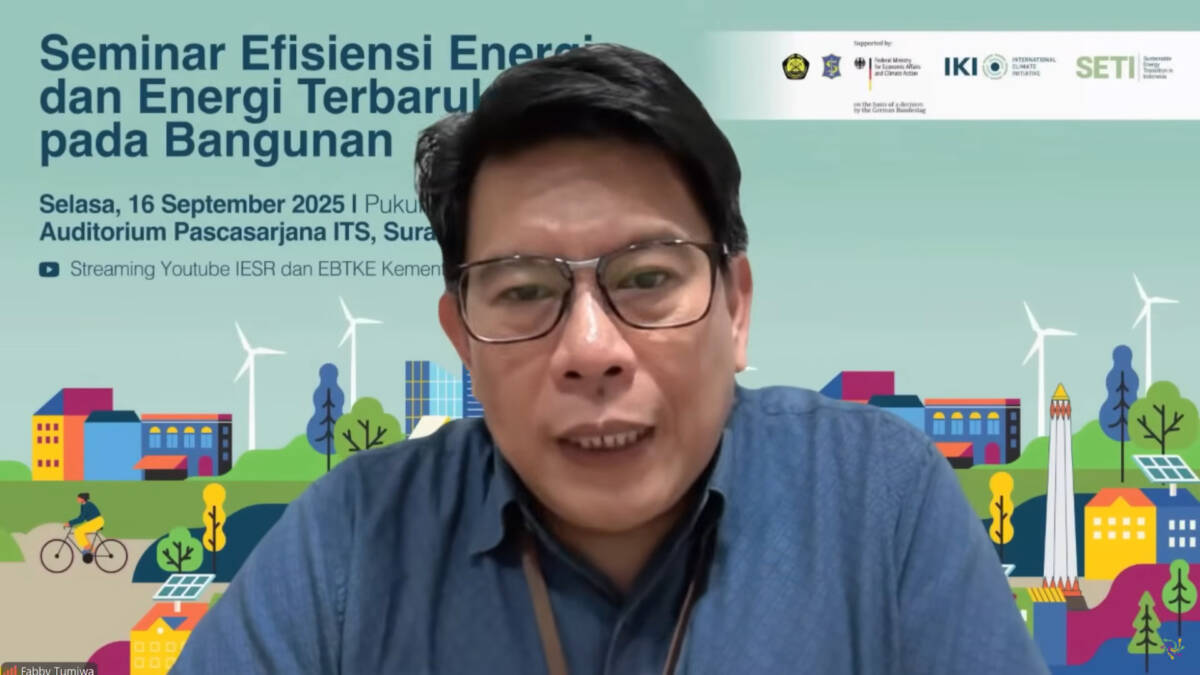Surabaya, September 19, 2025 — The Sustainable Energy Transition in Indonesia (SETI) project, in collaboration with the Ministry of Energy and Mineral Resources through the Directorate General of New, Renewable Energy, and Energy Conservation (EBTKE), has designated Surabaya as a pilot city to accelerate emission reductions in the building sector. To launch a series of initiatives aimed at strengthening stakeholder capacity, SETI organized a Seminar on Energy Efficiency and Renewable Energy in Buildings (16/9/2025), at the Sepuluh Nopember Institute of Technology (ITS), Surabaya.
The Mayor of Surabaya, represented by Irfan Wahyudraja, Head of the Surabaya City Development Planning Agency, emphasized that green buildings are not merely a discourse but a real necessity amid rapid urbanization and growing energy demand. He highlighted Surabaya as one of the most innovative cities in Indonesia, particularly in advancing sustainability. As evidence, Surabaya ranked first out of 79 cities in the 2024 Integrated Sustainability Indonesia Movement (I-SIM) for Cities assessment, achieving an SDGs score of 76.38.
The city government has also developed green open spaces, urban forests, botanical gardens, and mangrove conservation areas. In addition, it has implemented LED-based traffic lights and public street lighting and installed rooftop solar power plants in schools and government buildings.
“Surabaya has begun adopting electric vehicles, although it still faces infrastructure challenges, particularly the limited availability of fast-charging stations,” Irfan added.
Fabby Tumiwa, Chief Executive Officer (CEO) of the Institute for Essential Services Reform (IESR), revealed that IESR, as a member of the SETI consortium, is currently assessing the basic energy consumption values in buildings in Surabaya. There is a total of 295 buildings in the sample. This study is expected to provide accurate data for policymakers to support energy conservation efforts, the use of renewable energy, and mapping future energy needs, as well as estimating future costs for building operations.
“About 30 to 40 percent of global greenhouse gas emissions come from buildings, both from construction materials such as cement, steel, ceramics, and building operations related to heating, cooling, and other electricity use. Therefore, energy efficiency through building design, energy-saving technology, renewable energy utilization, and energy-saving behavior are very important to reduce emissions,” explained Fabby.
Fabby added that SETI also provides both certification and non-certification training for selected personnel to become energy managers and green building assessors.
Meanwhile, Agus Muhammad Hatta, Vice Rector for Research, Innovation, Cooperation, and Alumni Affairs at ITS, highlighted that modern lifestyles, which involve more indoor activities, make environmentally friendly building management increasingly essential for addressing sustainability challenges.
Hendra Iswahyudi, Director of Energy Conservation at the Ministry of Energy and Mineral Resources, referred to data from the Global Energy Review, which shows that electricity consumption in the building sector has increased nearly fourfold between 2003 and 2024, from less than 200 TWh to more than 600 TWh. The sharpest growth came from cooling needs, particularly for data centers driven by the rise of AI, as well as from electric vehicles.
He emphasized that energy efficiency and low-carbon technology strategies are critical steps toward achieving the net-zero emissions target by 2060, or sooner.
“For the building sector, the priority is implementing energy management practices and Minimum Energy Performance Standards (MEPS) for household appliances. Currently, eight types of appliances are covered by these standards. However, support from city governments is essential to educate the public on choosing appliances with a five-star energy efficiency label. While the upfront cost is higher, users will benefit from significant long-term savings on electricity bills,” Hendra explained.
Hendra further noted that energy efficiency is a combination of habits, behavior, and technology. Under ESDM Regulation 8/2025, every industrial, building, and transportation sector entity is required to appoint an energy manager and designate an energy auditor to carry out audits and reporting, the results of which must be followed up with concrete recommendations.
To strengthen financing, the government is also encouraging banks to channel investments into energy efficiency programs through the Indonesian Sustainable Finance Taxonomy scheme.
The Seminar on Energy Efficiency and Renewable Energy in Buildings was organized under the Sustainable Energy Transition in Indonesia (SETI) program, a joint initiative of the German Federal Government and the Government of the Republic of Indonesia, represented by the Directorate General of New, Renewable Energy, and Energy Conservation of the Ministry of Energy and Mineral Resources. The project is implemented by a consortium comprising GIZ, the Institute for Essential Services Reform (IESR), the World Resources Institute (WRI), and the Indonesia Cerah Foundation.

